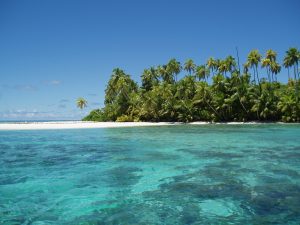The United Kingdom is drawing a curtain over its last colonial possession in the African continent with the transfer of the sovereignty of the Chagos archipelago. While the Mauritius-U.K. agreement has gained global attention, notice should also be given to the role played by India in the negotiations behind the curtain, including New Delhi’s consistent support to Mauritius’ demand on global platforms.
The agreement concluded between the U.K. and Mauritius grants complete sovereignty of the Chagos Islands to the latter, except for Diego Garcia island, which currently houses a secretive U.S. military base in the middle of the Indian Ocean. The deal will allow the resettlement of the Chagossians who were expelled in the 1960s and, at the same time allow the United States to continue operating the base.
India’s Ministry of External Affairs has welcomed this development, stating it is “in line with its principled stand on decolonization and support for the sovereignty and territorial integrity of nations.” The key takeaways from New Delhi’s diplomacy in settling the Chagos issue include the following.
First and foremost, India has once again shown to the world its firm belief in negotiation and diplomacy in settling even the most difficult geopolitical issues. Prime Minister Narendra Modi has repeatedly emphasized this, from his Shangri La Dialogue speech in 2018, where he focused on the peaceful settlement of disputes by respecting international law, to his recent visit to Ukraine where he reiterated the need for dialogue and diplomacy to end the conflict. This must also send strong signals to other neighbors and important partners of India that are currently locked in territorial disputes with New Delhi. A lasting solution resides in negotiation and diplomacy, leading to a win-win situation for all.
Second, the acknowledgment of India’s role in the negotiation by both the key stakeholders, Mauritius and the U.K., is a testament to India’s evolving role in shaping the security architecture of the Indian Ocean. India is a resident of the Indian Ocean, and its canopy-shaped geography jutting into the central Indian Ocean provides it control over 60 percent of the strategic waters. To this end, New Delhi has played a significant role in cultivating diplomatic and developmental ties with all the Indian Ocean island countries since their independence – in the case of Mauritius, much before its independence.
The Indian Ocean region continues to hold a central place in Indian strategic thinking, as seen in Modi’s inviting of the heads of several Indian Ocean island countries to his swearing-in ceremony in 2024. By being a significant player in dispute resolution, India has showcased its commitment to ensure that the Indian Ocean remains peaceful and stable and keeps up the rules-based order.
Another important implication of India’s role in the Chagos settlement is the growing convergence between India and the United States in the Indian Ocean. The U.S. has been operating a military base in Diego Garcia, the largest island of the Chagos archipelago, from the 1970s onward. Camp Thunder Cove (the name of the U.S. military complex on Diego Garcia) played a quintessential role both during the Cold War and later in extending the reach of the U.S. Navy and Air Force in Africa, West Asia, and other parts of Asia. The significance of this base continues in the present times as Washington evolves its strategies to deal with its peer competitor China in the Indo-Pacific region and focuses on increasing its deterrence ability.
Simultaneously, New Delhi’s external balancing has remarkably increased in the last two decades due to the changing conditions both on the territorial and the maritime frontier, and Washington is a pivotal player in that. To this end, India has also signed four foundational agreements with the U.S. to improve interoperability and the reach of its defense forces across the Indo-Pacific region. As China’s footprints in the Indian Ocean region become more strategic and security-oriented, India is increasingly coming to accept that it is difficult for a single country to deal with the variety of threats existing and emerging in the Indian Ocean.
In this context, the cooperation between India and the United States is here to stay, and it seems that both democracies have played a purposefully indirect yet significant role in settling the Chagos dispute in such a fashion that has served both well. On one hand, the sovereignty issue has been settled in regard to decolonization and will allow the return of the expelled Chagossians. On the other hand, the continued U.S. presence at Diego Garcia is a strong commitment to Washington’s interest in the region, its allies, and global partnerships. All this is also beneficial to India as it finds ways to deal with the rising footprints of China in the Indian Ocean.
Recognition of both India and the U.S. by the primary stakeholders, Mauritius and the U.K., points toward some back-channel diplomacy that involved all four countries. Concomitantly, by reaching an agreement, the stakeholders have limited the space for Chinese maneuver in the Indian Ocean.
Last, but not least, by walking the decades-old talk on demanding sovereignty for Mauritius and holding firm throughout the negotiation process, India has shown its commitment to its all-weather friendship with Mauritius, a small island nation in the Indian Ocean, an immediate maritime neighbor, and a country of the Global South. This further provides India with an opportunity to be a leading developmental and security partner of Mauritius as it resettles Chagossians on the archipelago.

































